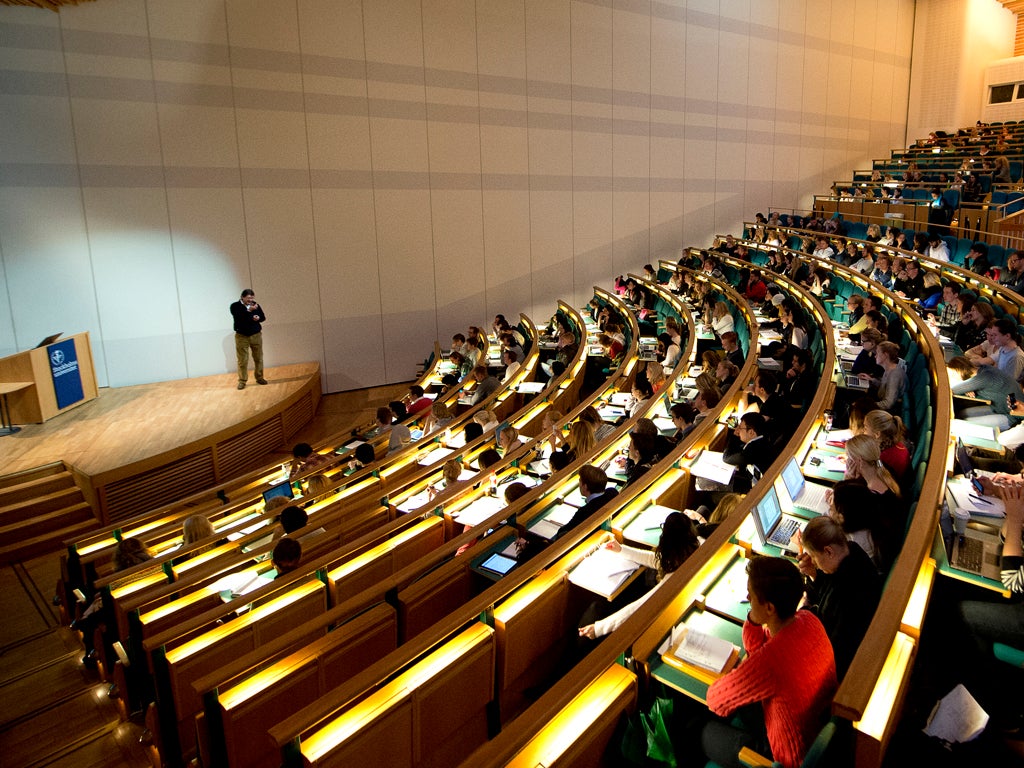It’s shameful that our universities have accepted gender segregation under pressure from the most oppressive religious fanatics
This capitulation is a disaster for feminism, progressive ideals and above all Muslims

This Tuesday, 10th December, is Human Rights Day. It is my birthday too, and insha-allah (God willing) I plan to mark both by joining a demo outside Woburn House in Tavistock Square, London. These are the offices of Universities UK (UUK), an affiliate which describes itself as “the voice of UK universities”, which is a bit presumptive I think, especially now.
In its wisdom, this august body has published guidelines on gender segregation at universities. The issue has been raised over the last few years by lecturers and students who complain that, for certain events, organisers and speakers expect men and women to either sit apart or that women not attend. Sexist dress codes and other behaviours are being spread and pushed in British universities by retrograde Islamic societies and individuals, most of them men – though there are always willing maidens who say “yes, yes, yes” to such diktats. UUK upholds this apartheid and offers up nauseating justifications. It’s done in the name of free speech. Yes, really. “Concerns ... [for the] beliefs of those opposed to segregation should not result in a religious group being prevented from having a debate in accordance with its belief systems.” Furthermore, staff should not worry unduly about the rights and wrongs of this small matter.
So, as of now, separation in lecture halls and seminar rooms is fine as long as women don’t have to sit behind men (gee thanks!) but can be seated in lecture hall reservations. Separate but equal. Just as Boers ordered society in pre-freedom South Africa. So should gays have to sit apart from heterosexuals? Hindus be kept equal and apart from Muslims? If EDL members want to have meetings and insist blacks can only sit in designated areas, I suppose UUK would not object. Having conceded to the most objectionable demands once, they would absolutely have to again and again.
What will they do if a Muslim female Mandela sits with the men? Will they carry her out and throw her down the steps? Some preachers on campus are today telling women to get back into the home, to get out of public life. Muslim women in jeans or with hair uncovered have been asked to leave lecture rooms by clothes vigilantes. Two Muslim LSE students harangued me for my unholy attire and views just a month back. Such guidelines, in effect, endorse the most offensive prejudices about women: that they are a social and moral peril and if they sit with men, pornographic fantasies or molestations will make it impossible for anyone to concentrate on lectures, say, on Plato or the Life of the Prophet. Think of how grades will tumble, and league table results. One wonders who and what else universities will accommodate to get their hands on £9,000 per year per student.
Throngs of students, academics, parents, politicians, and feminists should fill Tavistock Square and shout out loud. Not that they will, what with Christmas shopping and perhaps inchoate fears. Various student unions roll over, again and again, before Islamicists and their outrageous demands – backing full veils, speeches by Wahabis – and thus far, there has been no clear condemnation from the NUS of this disgraceful document penned by the deluded UUK. This latest capitulation is a disaster for feminism, for university life, for modernism, for progressive ideals and for Muslims most of all.
Muslim educational achievements are so abysmally low because our educators do not liberate them from dark age interpretations of Islam but rather encourage them. (Perhaps it’s a cunning plot to keep them down and out of mainstream life!) I know of female medical students – three Muslim and one Orthodox Jew – who will not touch male patients, of all-male religious professional networks and even worse examples.
I end with a poem by the American poet Stephen Dobyns.
A cry was heard among the trees,
not a man’s, something deeper.
The forest extended up one side
the mountain and down the other.
None wanted to ask what had made
the cry. A bird, one wanted to say,
although he knew it wasn’t a bird.
... They waited
for it to come a second time. It’s lost,
one said. Each thought of being lost
and all the years that stretched behind.
Where had wrong turns been made?
Soon the cry came again. Closer now.
Join our commenting forum
Join thought-provoking conversations, follow other Independent readers and see their replies
Comments
Bookmark popover
Removed from bookmarks